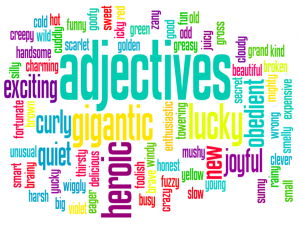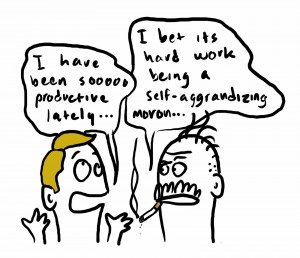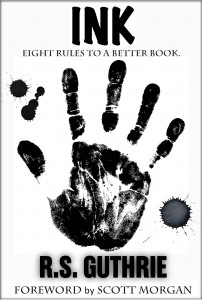Adverbs and Adjectives are NOT Your Friends
 Okay, maybe they are friends, but let’s agree to classify them as the kind of friends you invite to your house and after a half-hour spend the rest of the night hatching different plans to get them to leave.
Okay, maybe they are friends, but let’s agree to classify them as the kind of friends you invite to your house and after a half-hour spend the rest of the night hatching different plans to get them to leave.
Seriously. Too many writers, particularly when starting out, think that the more they sprinkle their prose with adverbs and adjectives, the better it will most certainly become. Not true. In fact, the quality of your writing declines by inverse proportion to the number of overly-descriptive adverbs/adjectives per sentence. (For you non-math folk, that means more overly-descriptive adverbs/adjectives = dung writing).
Don’t believe me? That’s okay. It’s your right to write the way you see fit. But before you go marching off into the sunset, let me give you an example. Now this is a real, newly-released novel by a writer I know. I am not great friends with the writer, and I hope he/she is NOT reading this blog, but let me offer this: dear friend, if you are reading, and you recognize your words, I promise I tried to select a few sentences only, so as not to identify you, and I will not mention your name.
Here are the examples (from the first 2-3 paragraphs):
Resurfacing with a sputter and a playful splash, her coquettish expression slowly transformed into a grin…
Knocked underwater and dragged along the gritty bottom by a capricious Mother Nature, he humbly righted himself with a cough and sheepish grin.
Alone with the now cloying smells of the sea, desperation blossomed. Only the fleeting scent of his wife’s perfume slowed its bloom.
Diving into the choppy water, he swam with herculean effort toward the receding figure.
Now, by my count, in those five sentences, there are a dozen adverbs or adjectives. Not to make this about the math, again, but that’s more than two per sentence. Are all of them unnecessary? Probably not. I would think “choppy” and perhaps “receding” could be necessary to the scene, but I would argue NOT in the same sentence (and that there are other much more powerful writing techniques to create the desired scene).
 I also want to make a slightly self-aggrandizing point. I am a third the way through this blog post and I challenge you to find any overly-descriptive adjectives—other than “self-aggrandizing” (which I intentionally used to show you both the impact of a particular description jarring its way into the reader’s face and to let you know I was aware that my example might seem self-serving).
I also want to make a slightly self-aggrandizing point. I am a third the way through this blog post and I challenge you to find any overly-descriptive adjectives—other than “self-aggrandizing” (which I intentionally used to show you both the impact of a particular description jarring its way into the reader’s face and to let you know I was aware that my example might seem self-serving).
That being said, I am serious. In the previous paragraphs, there is only a sunset, not a fleeting, rapturous, coquettish one.
Let me come at this from a slightly different angle: go back to where I (metaphorically) described the type of friends adverbs and/or adjectives might be. Did you not understand that they might be clingy, raucous, calloused, impolite, needy, rude, pathetic, smelly, greedy, or otherwise undesirable and unwelcome? Did I need to use any of those words to paint the image?
Don’t get me wrong; it took me a long time writing before I realized (and was convinced regarding) this nugget of information. In all seriousness, these elegant, vivacious, garrulous, sheepishly capricious words are, in a single word, unnecessary. In fact, in several words, they are poison to your quality.
 Last year I wrote a short book on making your book better. I didn’t write it to make a million dollars; I wrote it because I believe there are but a few, relatively simple techniques, some intentional omissions, and a practiced awareness of style, that can take whatever book you’ve written (or are writing), and make it exponentially better.
Last year I wrote a short book on making your book better. I didn’t write it to make a million dollars; I wrote it because I believe there are but a few, relatively simple techniques, some intentional omissions, and a practiced awareness of style, that can take whatever book you’ve written (or are writing), and make it exponentially better.
If you don’t believe me, try this: find a chapter in your book that has the most adjectives and adverbs (yes, you’ll need to count), and send it to a trusted friend to read. Don’t ask for any feedback. Yet. After sending your chapter to your reader, go through and remove at least 90% of the adverbs and adjectives. Just leave the sunset alone. Also change all dialogue (if there is any) to “said”. Period. Not chuckled magnanimously. Just SAID.
Now if removing said adverbs or adjectives requires a little rewriting [i.e. the sentence structure doesn’t make sense when removing the word(s)], then rewrite it. The chapter still needs to be readable. When you are finished with your edits, send it back to the same person. Ask them to read it and give you their opinion on which was the better read.
Here are the five sentences I borrowed as example, adverbs and adjectives removed:
Resurfacing with a sputter and a splash, her expression transformed into a grin…
Knocked underwater and dragged along the bottom by Mother Nature, he righted himself with a cough and a smile.
Alone with the smells of the sea, desperation blossomed. Only the scent of his wife’s perfume slowed its bloom.
Diving into the choppy water, he swam with all his strength, yet the figure continued to recede.
I’ll let you be the judges, but I say the second set are equally as dramatic and far less cliche. And I am not taking credit; for the most part, I simply removed the adverbs and adjectives (and changed the second “grin” in as many sentences to “smile”—another of my short-list of rules: don’t repeat words).
Of course, if being coquettish is your thing, by all means, coquette; and do it to your heart’s belabored, melodious, Herculean content.
~~~~~~~~~~~~~~~~~~~~~~~~~~~~~~~~~~
The blank page is dead…long live the blank page.
~~~~~~~~~~~~~~~~~~~~~~~~~~~~~~~~~~
 Author known to use spontaneous satire, sarcasm, and unannounced injections of pith or witticisms which may not be suitable for humorless or otherwise jest-challenged individuals. (Witticisms not guaranteed to be witty, funny, comical, hilarious, clever, scintillating, whimsical, wise, endearing, keen, savvy, sagacious, penetrating, fanciful, or otherwise enjoyable. The Surgeon General has determined through laboratory testing that sarcasm can be dangerous, even in small amounts, and should not be ingested by those who are serious, somber, pensive, weighty, funereal, unsmiling, poker-faced, sober, or pregnant.) For those who enjoy and/or revel in the utterance of profanity, the author reserves the right to substitute “fish” for “fuck” without fear of repercussion, mental reservation, or purpose of evasion.
Author known to use spontaneous satire, sarcasm, and unannounced injections of pith or witticisms which may not be suitable for humorless or otherwise jest-challenged individuals. (Witticisms not guaranteed to be witty, funny, comical, hilarious, clever, scintillating, whimsical, wise, endearing, keen, savvy, sagacious, penetrating, fanciful, or otherwise enjoyable. The Surgeon General has determined through laboratory testing that sarcasm can be dangerous, even in small amounts, and should not be ingested by those who are serious, somber, pensive, weighty, funereal, unsmiling, poker-faced, sober, or pregnant.) For those who enjoy and/or revel in the utterance of profanity, the author reserves the right to substitute “fish” for “fuck” without fear of repercussion, mental reservation, or purpose of evasion.



Amen to that. I once thought I was supposed to get paid by the adjective. I was wrong. And I won’t do it again.